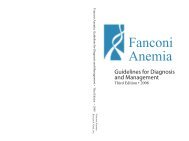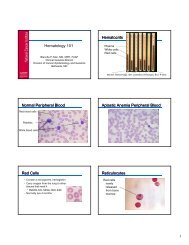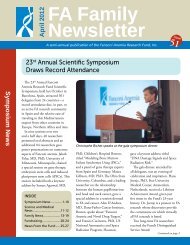FA Family Newsletter - Fanconi Anemia Research Fund
FA Family Newsletter - Fanconi Anemia Research Fund
FA Family Newsletter - Fanconi Anemia Research Fund
- No tags were found...
You also want an ePaper? Increase the reach of your titles
YUMPU automatically turns print PDFs into web optimized ePapers that Google loves.
Early Gynecological Care is Essentialfor Girls with <strong>FA</strong>Given the special healthrisks associated with<strong>Fanconi</strong> anemia, parentsneed to introduce their girlswith <strong>FA</strong> to the need forgynecologic care early. Thefirst appointment should beat age 16 or at the onset ofmenstruation.Rahel Ghebre, MD,University of Minnesota,stated that establishing trust with a gynecologist is ofparamount importance and should be the main purposeof the first visit.The gynecologist needs to be aware of <strong>FA</strong>-associatedgynecological complications or be willing to learn.Patients should be prepared to discuss potentiallysensitive issues such as sexual activity, contraception andrisk for sexually-transmitted diseases.The physical exam should include a careful evaluationof the vulva, vagina and cervix. Annual screening shouldEarly Results Reported from Alternate Donor, MulticenterTransplant Study Using Radiation-Free ApproachSteve Margossian, MD,PhD, Dana-Farber CancerInstitute, reported on afive-center transplant studyusing alternate donors andbusulfan instead of radiationin the conditioning protocol.Participating centers areMemorial Sloan-KetteringCancer <strong>Research</strong> Center,Children’s Hospital Boston,Children’s Hospital of Wisconsin, Cincinnati Children’sHospital Medical Center and the Fred HutchinsonCancer <strong>Research</strong> Center. Fourteen patients have enrolledin this study, ranging in age from 5 to 27, with a medianage of 8. One of the concerns of the study was thatinclude a Pap test and vulvar and vaginal inspection forlesions. Colposcopy is useful to magnify this area, andshould be followed by biopsy if suspicious lesions areseen. Lesions of the vulva or vagina should be treatedaggressively with surgery, since <strong>FA</strong> patients may respondpoorly to standard radiation and chemotherapy. Otherpossible therapies include laser surgery of lesions of thevulva or vagina and topical medicine such as Aldara(imiquimod) or 5-fluorouracil for pre-cancerous lesions.At each annual visit, patients should be tested forsexually-transmitted infections (including gonorrheaand chlamydia) until age 25, a standard of the USCenters for Disease Control and Prevention. Dr. Ghebrerecommended use of condoms to prevent sexuallytransmittedinfections. Contraception should be usedwhen pregnancy is not desired.The human papillomavirus (HPV) causes cervicalcancer and genital warts. It has also been implicated invulvar, vaginal and anal cancer. <strong>FA</strong> patients should bevaccinated against HPV as early as age 9.removing radiation would lead to poor engraftment, butso far all 14 patients have engrafted. Eleven patients arealive and disease-free at one to 24 months post-transplant.Deaths were attributed to infection, pulmonaryhypertension and multi-organ failure.One of the concerns of the studywas that removing radiation wouldlead to poor engraftment, but sofar all 14 patients have engrafted.Dr. Margossian stated that early results in engraftmentand survival were encouraging. Longer follow-up isneeded to assess the impact of this protocol on chronicgraft-versus-host disease and secondary malignancies.Science News From the <strong>Family</strong> Meeting<strong>Family</strong> <strong>Newsletter</strong> #50 3
















